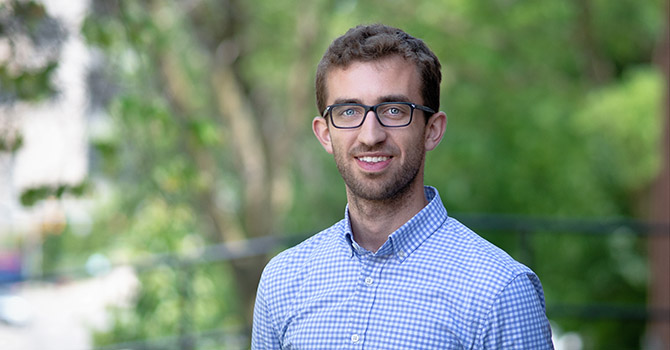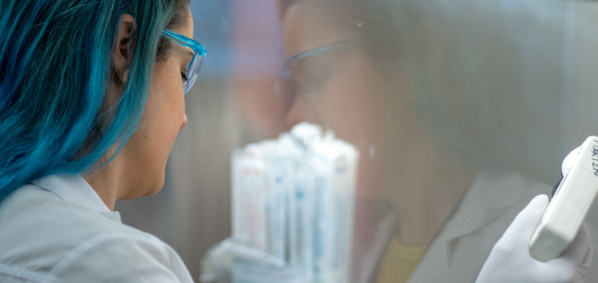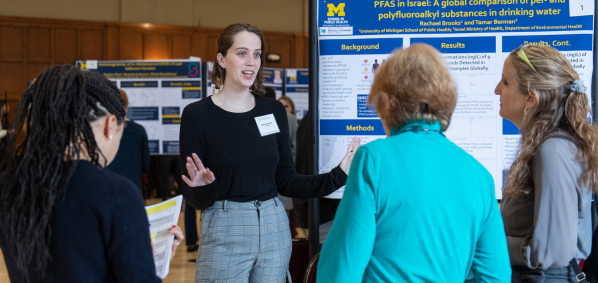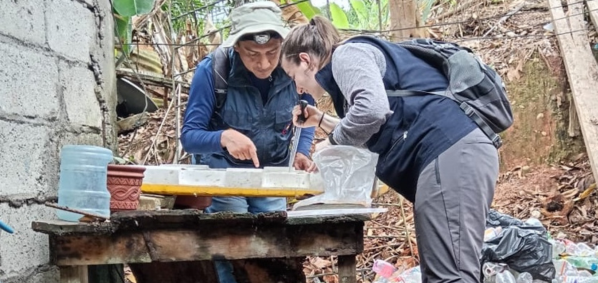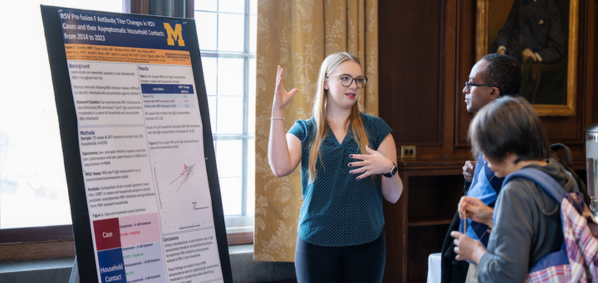Doctor of Philosophy (PhD) in Epidemiologic Science
The Department of Epidemiology will not be accepting PhD applications in Epidemiologic Sciences for Fall 2026 enrollment. Details about admissions for the Fall 2027 cohort will be available on our website in June 2026. Thank you for your interest in our program.
Welcome to the PhD program in Epidemiologic Science where our students are trained to become leaders in academia, government, and industry. Each cohort of students enters as pre-candidates and generally takes one year of classes. During this time and throughout the program, life-long professional and personal bonds are formed within the cohort, with other PhD students, and with faculty. After passing the comprehensive written exam (usually after the first year in the program), students advance to candidacy and write their dissertation proposal (prospectus) during the second year in the program. It typically takes four years to complete the PhD in the Department of Epidemiology, but this varies by student. You can see statistics on our students and graduates here. For a very detailed description of the Epidemiology Department's PhD guidelines please view the PhD guidelines (PDF). Notable aspects of our program include:
We welcome students from a wide variety of backgrounds. We are committed to attracting, training and engaging students, faculty and staff from different backgrounds, cultures, values and perspectives, and we strive to create a community where all are supported.
Our 70+ faculty are world-renowned. Not only are our faculty foremost experts in infectious and chronic disease research, they are leading the field in disease modeling, public health practice, and policy development.
We fund 100% of our students. Admissions offers include two to five years of tuition and stipend funding, and over the past ten years, we have provided five years of funding to all of our students (if needed).
Our PhD students are embedded in a research team. Immediately upon admission, students are welcomed by their mentors into a robust research setting with unparalleled opportunities for hands-on learning.
State-of-the-field didactic training is provided. We continuously review our curriculum to ensure we are providing our students with all of the tools needed to succeed in academia, government, industry, and the non-profit world.
Mentorship is central to the doctoral experience. Students join a collaborative, intellectually vibrant community where faculty are deeply invested in their growth. Each student is paired with a dedicated mentor and a network of advisors who provide guidance on research, teaching, and career development. Our graduates often point to these close mentoring relationships as one of the most rewarding aspects of their Michigan experience.
Travel and research funding is widely available. In addition to funding provided by the department, our PhD program is part of the University of Michigan Horace H. Rackham School of Graduate Studies (Rackham) which offers travel funding for doctoral students to present their work at national and international conferences and research grants to support their dissertation work.
Our students are exceptional. You can see our current doctoral student profiles here. Our students have won university-wide scholarship competitions, received scholar-in-training awards from international organizations, published their work in top-tier journals, and presented their work at the most prestigious meetings.
The Department of Epidemiology seeks to provide doctoral students with a supportive environment in which to learn the skills needed to enter the profession of Epidemiology as independent scholars. These skills will include an understanding of causal inference, the ability to design robust studies and a proficiency in the management and analysis of health data.
Our admissions process is holistic so there is no perfect recipe for success. Applicants are evaluated based on undergraduate and graduate academic records, letters of recommendation, and commitment to a career in epidemiology. We only admit students who we believe will be successful in our program. If you do not meet the minimum requirements, please contact EpidAdmissions@umich.edu before submitting an application.
Specific minimum requirements include:
- An MPH in Epidemiology, or other relevant master's degree (e.g. Master of Public Health, Master of Science in Biostatistics, or other related degree).
- Completed at least one public health or research methods course, preferably epidemiology and/or biostatistics.
- Competitive applicants will have demonstrated strong academic performance (B+ or better) in epidemiology, biostatistics, or related courses.
- International applicants only: Applicants whose native language is not English must demonstrate English proficiency (TOEFL scores). The TOEFL University of Michigan Institution Code is 1839. The minimum scores required for admission are a TOEFL Internet-based (iBT) of 100+ or an IELTS of 7.0+. Applicants who have earned a degree from an institution where the language of instruction is exclusively English are exempt from submitting an official English proficiency score.
Other prior coursework and experience: Our doctoral curriculum is designed to build upon prior preparation at the level of a masters in public health. Before entering the program, we recommend that students have received prior training in basic regression techniques, the major elements of epidemiologic study design, and in writing code in one of the major coding languages used in epidemiology (SAS, R, STATA, etc). Our departmental courses are taught in R, and students who are not comfortable with this language are advised to introduce themselves to programming in R prior to beginning didactic coursework.
Our model is based on mentor-mentee matches, thus you are strongly encouraged to review our profiles to identify faculty with shared research interests. Listing potential mentors on your application is encouraged. Please note that only core faculty members can accept PhD students, however, your application may be shared more broadly for funding and mentorship identification purposes.
View Current Doctoral Student Profiles
Admission Procedure
Applicants for the Epidemiologic Science PhD program should complete the Rackham School of Graduate Studies application. The Epidemiology PhD program is listed as "Public Health Epidemiologic Science".
Application Information
Through the online application (Rackham School of Graduate Studies), applicants must submit the following:
- Statement of Purpose
- A concise (2 pages or less), well-written essay about:
- Why you want to pursue a PhD in Epidemiology and why you are qualified to do so;
- Your academic and career goals; and
- How our graduate program will help you meet your goals.
- Please indicate the area(s) of research and departmental faculty that are of interest
to you.
- Refer to our list of departmental faculty.
- Please note that only core faculty should be listed as potential mentors.
- This statement is an important part of the application to help us find a potential mentor for you. Consider getting feedback from mentors, peers, and a writing center if you have access to one. There are also many online resources to help you write outstanding personal statements.
- A concise (2 pages or less), well-written essay about:
- Personal Statement
- This statement should be a brief (500 word limit) description of your background.
- How have your background and life experiences, including cultural, geographical, financial, educational, or other opportunities or challenges, motivated your decision to pursue a PhD in epidemiology and the specific area that you would like to focus on. Please be sure to highlight your experiences that make you a strong candidate for the program.
- If you would like to provide context on any aspect of your application, such as a few poor grades on your transcript, please do so here.
- Quantitative Experiences Statement
- In an effort to gain an understanding of your quantitative skills, we require a statement as part of the application process.
- This short essay (limited to 500 words) asks you to summarize the strength of your
analytical and quantitative skills by addressing the following (if applicable):
- Discuss specific details and examples of relevant research, work, volunteer, or professional experiences that involved analytical and/or quantitative skills and tasks. You may also incorporate instances where you worked with data.
- If you have experience working with quantitative data, describe how you used it to solve a complex problem and include how you communicated your findings.
- Transcripts
- Applicants who attended or are attending a U.S. Institution:
- Upload an electronic version of your official transcript(s) for each Bachelor’s, Master’s, Professional, or Doctoral degree earned or in progress through your ApplyWeb application account.
- Applicants who attended or are attending a Non-U.S. Institution:
- Review Required Academic Credentials from Non-U.S.Institutions for transcript/academic record requirements by country or region. Submitting transcript/academic records is a two-step process.
- Upload an electronic version of your official transcript/academic record for each institution attended through your ApplyWeb application account.
- See Rackham’s detailed instructions on how to submit transcripts/academic records to the Rackham Graduate School.
- Applicants who attended or are attending a U.S. Institution:
- Three Letters of Recommendation - academic and professional recommendations are desired; personal recommendations are not accepted.
Standardized Tests
Michigan Public Health does not require and does not review GRE or other standardized test scores for admission to any master's or doctoral programs. Applications will be reviewed holistically based on required application components. Please contact our admissions staff at sph-inquiries@umich.edu if you have questions.
Fee Waivers
In certain circumstances, you may be eligible for an application fee waiver administered by Rackham Graduate School. Visit the Rackham Graduate School website to determine whether you qualify for any available fee waivers. Please note that because the number of fee waivers available from Rackham are limited, we are not able to guarantee waivers for all qualified applicants.
- Critically evaluate and synthesize the scientific literature and develop new hypotheses to address gaps in our knowledge.
- Have a mastery of epidemiology study designs and select a design that is appropriate to address a specific study question.
- Demonstrate a thorough understanding of causal inference, sources of bias, and methods to improve the validity of epidemiologic studies.
- Design a research project that addresses an important population health or clinical question, using appropriate epidemiologic methods under constraints confronted in practice.
- Understand the principles and methods of data collection and data processing procedures in the design and conduct of epidemiologic research, with sound knowledge of measurement validity and reliability, data quality control, data management, documentation, and security.
- Employ state-of-the-art statistical and other quantitative methods in the analysis of epidemiologic data.
- Demonstrate mastery in a substantive area of population health, and in this area integrate relevant biological, behavioral, and social mechanisms that operate at multiple levels of causation.
- Demonstrate excellent skills in the writing of scientific papers and grant applications.
- Provide clear and effective oral communications of epidemiologic concepts, methods, results, and implications to scientists, students, policy-makers, and the public.
- Understand and demonstrate in practice the ethical responsibilities of an epidemiologist to behave with scientific integrity.
After admission to the doctoral program, there are two major stages in the program to be completed before receiving your PhD degree. These stages are the pre-candidacy stage and the candidacy stage.
Pre-Candidacy
The major tasks of a pre-candidate are to acquire 18 in-residence course credits (with three cognate credits of non-epidemiology coursework); complete the epidemiology course requirements; and successfully pass the written competency examination.
Candidacy
The major tasks of a candidate are to develop a dissertation research plan; write a prospectus of the proposed dissertation research plan; present the research plan to the entire dissertation committee during the oral preliminary examination and receive approval of the proposed dissertation research; complete the proposed dissertation research with the ongoing guidance of the dissertation committee; and present the dissertation research in a final oral examination, the dissertation defense.
In general, the entire (matriculation to degree earned) Epidemiologic Science Doctoral Program takes a total of 3 to 5 years to complete (median time to degree completion is 4 years). The actual duration depends on the time it takes to: a) prepare for and pass the competency exam (1 or 2 years); b) develop a dissertation research plan and pass the oral preliminary examination (about 1 year); and c) complete the dissertation research and successfully defend it during the final oral examination (1-3 years).
The Department of Epidemiology has an excellent track record of fully funding all of our students for the duration of their degree. All Epidemiologic Science doctoral students are admitted with at least a two-year funding plan and paired with a mentor. There are four main types of financial support that we offer our students: Graduate Student Research Assistant (GSRA), Graduate Student Instructor (GSI), Training Grants positions and Fellowships.
Funding for Doctoral Students
All students admitted to one of our doctoral programs are considered for financial support. There are four types of financial support that we offer our students: Graduate Student Instructor (GSI), Graduate Student Research Assistant (GSRA), Training Grants and Fellowships.
Graduate Student Instructor (GSI)
Graduate Student Instructors are appointed at 50% effort, which involves working approximately 20 hours per week. This appointment includes full payment of tuition, health insurance coverage, registration fees, and a monthly stipend. The duties of a GSI can include preparing materials for labs, teaching labs, holding office hours, grading homework and exams, and tutoring.
Graduate Student Research Assistant (GSRA)
Graduate Student Research Assistants are appointed at 50% effort, which involves working approximately 20 hours per week on a research project. This appointment includes full payment of tuition, health insurance coverage, registration fees, and a monthly stipend. GSRAs generally work closely with a faculty member who is a principal or co-investigator on the research project. The duties of the GSRA can involve analysis of biomedical research data or statistical research. Currently, GSRAs are working on projects involving statistical methods development and application to bioinformatics, cancer, clinical trials, dentistry, diabetes, environmental health, epidemiology, genetics, health education, kidney disease, and survival analysis.
Training Grants
Some students are supported through involvement in training grants which provide support similar to the GSRA or GSI appointments. Check with your department for specific training grants available.
Scholarships, Fellowships and Awards
Awards for tuition assistance are available and are granted without a work obligation. These awards are generally made on the basis of academic merit, expected contribution to the field, and to students with underrepresented backgrounds. Some examples of awards our students have received include:
- Harold and Vivian Shapiro/John Malik/Jean Forrest Awards
- Rackham Merit Fellowship Program
- Rackham Non-Traditional Fellowship
Other award/scholarship opportunities exist for continuing students. They include:
- Rackham One-Term Dissertation Fellowship
- Barbour Scholarship
- Pre-Doctoral Fellowship
- Susan Lipschutz, Margaret Ayers Host, and Anna Olcott Smith Awards for Rackham Graduate Students
- Rackham Conference Travel Grant
Financial Aid for Doctoral Students
Many of our students are offered funding as GSIs, GSRAs or graduate fellows. If you do not receive such an offer, you may apply for financial aid through the University of Michigan’s Office of Financial Aid. This office requires applicants for any and all types of financial aid to complete the Free Application for Federal Student AID (FAFSA) provided by the American College Testing Center (ACTC).
A FAFSA will be sent to you directly if you indicate your interest in financial assistance on the admission application form. FAFSAs are available from most high school or college libraries and financial aid officers, as well as from the School of Public Health Office of Student Affairs.
Ready to Apply?
Visit the Admissions & Aid section of the U-M SPH site for details on the application process and financial aid options.

